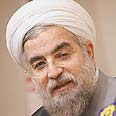
Hassan Rohani
צילום: רויטרס
Experts: 2nd Iran letter ground for talks with US
President Ahmadinejad's letter to President Bush was rejected by Washington, but second letter sent to White House by aides of spiritual leader Ayatollah Ali Khamenei includes 'hopeful signs' for launching negotiations
The White House rejected a letter sent by Iranian President Mahmoud Ahmadinejad to President George W. Bush in which he suggested "new ways for getting out of the current, fragile international situation" over Iran's nuclear program.
American officials said the timing of the letter was meant to coincide with and influence Security Council talks and US Secretary of State Condoleezza Rice dismissed it as unserious, saying "this letter is not the place that one would find an opening to engage on the nuclear issue or anything of the sort."
But Time Magazine said a second letter written by an aide to spiritual leader Ayatollah Ali Khamenei offers serious grounds for negotiations.
The two-page letter, Hassan Rohani, defends Iran's resolution to acquire nuclear know-how but makes an offer that the issue be taken off the UN Security Council and be dealt with by the International Atomic Energy Agency.
Rohani wrote that Iran would "consider ratifying the Additional Protocol, which provides for intrusive and snap inspections," and that it would also "address the question of preventing 'break-out'," Time reported.
Nuclear experts consulted by Time said the letter offers "hopeful signs" that Iran may be willing to resolve the dispute over its nuclear activities.
As for US demands that Iran freezes uranium enrichment activities, which could allow the Islamic Republic to develop nuclear weapons, Rohani said Tehran would only agree "to negotiate with the IAEA and states concerned about the scope and timing of its industrial-scale uranium enrichment."
Although Rohani promised that Iran "Iran would accept an IAEA verifiable cap on enrichment limit of reactor grade uranium" on Iranian territory, that would not alleviate the concerns of the US and most of its European allies.
"In the context of Iran's domestic politics, which is the driving force behind Iran's the nuclear initiative, Rohani's proposals are significant because they have the imprimateur of the Supreme Leader, who would have approved them in advance," William Samii, the longtime senior Iran analyst at Radio Free Europe-Radio Liberty, told Time.
Ahmadinejad: Western concerns – big lies
"The important, if implicit message to Washington in Rohani's declaration," Samii said, "is you may not like hardline President Ahmadinejad, but we do have more pragmatic leaders with concrete proposals, like Rohani, whom you have known for years, and whom you can deal with now if you want. His proposals amount to recognition of Washington's concerns."
The letter is in contrast with remarks by President Ahamdinejad who lately said that western concerns over his country's nuclear activities are "big lies."
He also accused Western powers of trying to control the world's oil resources and creating a climate of fear that he said was forcing countries to stockpile weapons.
"The root cause of this is...the excessive demands of certain ruling powers over certain parts of the world," said Ahmadinejad, who arrived in Indonesia last Wednesday on a three-day visit.










